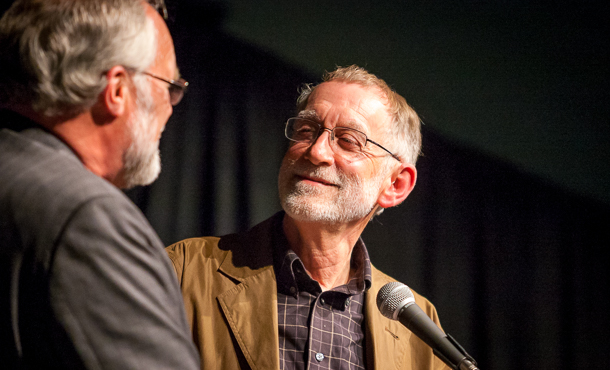The Renaissance Mennonite. A friendly service dog. A teddy bear. A creative prankster. Hot Rod Howie.
Many names were tossed at Howard Zehr the night of May 23, as his writing career and restorative justice work were humorously honored with a “roast” at Eastern Mennonite University. While most retiring professors of Zehr’s stature and worldwide celebrity are feted with a more standard banquet, a roast more suited both the man and his varied work.
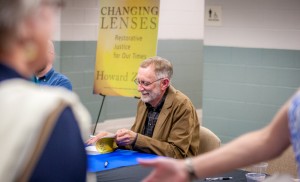
More than 300 attendees agreed, traveling from around the world to honor Zehr’s influence as a reformer, teacher, a mentor, and visionary; to mark his retirement as a full-time faculty member; and to celebrate the 25th anniversary of the publication of Zehr’s groundbreaking work, Changing Lenses: A New Focus for Crime and Justice.
The evening also provided an opportunity to support the ongoing work of the Zehr Institute of Restorative Justice, of which Zehr will remain a co-director with friend and colleague Carl Stauffer. A silent auction of global artifacts, artwork, locally crafted food and libations, and books, along with other donations, also raised about $15,000, not including pledges, for the continued work of the Zehr Institute.
After dinner…
Among comedians, a “roast” is a gathering at which a guest of honor is subjected to both praise and good-natured jokes at their expense. Stauffer, dressed in a suit and tie, emceed the evening’s festivities with Vernon Jantzi, a longtime colleague since Zehr’s arrival at the Center for Justice and Peacebuilding in 1996. Jantzi came more appropriately appareled to the podium in the requested “Howard Zehr-styled formal wear:” boots, tan khakis, a tan shirt, a camera slung about his neck and a Indiana Jones-looking hat.
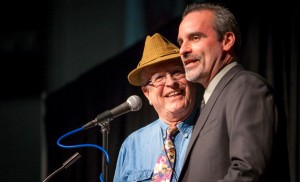
When queried by Stauffer about his neckwear, Jantzi looked at his floral tie and retorted: “This is a tie that’s as ugly as sin. I tried to get one as ugly as Howard would wear, but this is the best I could do.”
First on the program was a panel of alumni roasters, all of whom remarked in some capacity on their strong and shared personal friendship with Zehr, his sense of humor, and quiet way of inspiring confidence and empowerment. Among them was Catherine Bargen, MA ‘08, now restorative justice coordinator at the Ministry of Public Safety and Solicitor General in Vancouver, Canada, who spoke of becoming Zehr’s student one day and shortly after, accepting an invitation to co-present with Zehr at a conference.
“Howard sees something in you before you see it in yourself and he nurtures it until it comes to fruition,” said Tammy Krause, MA ‘99, a 14-year veteran of working federal capital cases who is herself a pioneer of an approach called defense-oriented victim outreach.
The youngest member of the panel, Katia Ornelas Nunez, MA ‘13, spoke of the serendipitous mistaken identity, and subsequent meeting, in her native Mexico, between Zehr – in Tamaulipas to present the keynote address at the First National Conference of Alternative Dispute Resolution Mechanisms – and poet and victims advocate Javier Sicilia, “two men who share similar bodies and souls.”
Danny Malec, MA ‘04, contextualized Zehr with a reference to Malcolm Gladwell’s “The Tipping Point,” which describes three types of “change makers.” “Howard for me is the consummate connector,” said Malec, citing Zehr’s skills in networking between practitioners and connecting his colleagues and students with exciting opportunities.
Paulette Moore, MA ‘09, took the microphone in “protest” to argue that the breadth and sheer vivacity of Zehr’s creative contributions in a variety of fields do not render him “the grandfather of restorative justice,” as he’s sometimes referred to, but rather “the Lady Gaga of restorative justice!”
Charito Calvachi-Mateyko, MA ‘06, a founding member of the nonprofit Latino Initiative on Restorative Justice, spoke movingly of Zehr’s influence on her personal journey from her native Ecuador and her current work as an educator and training of restorative justice in many Latin American countries.
Zehr’s recent photography exhibit, which focused on the aging body, took the brunt of several spirited jokes from Barb Toews, MA ‘00. Toews is a former student who has written The Little Book of Restorative Justice for People in Prison and co-edited Critical Issues in Restorative Justice.
Guest Roasters
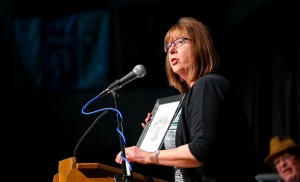
A panel of guest roasters included nine distinguished colleagues, some of whom wrote or provided video greetings: RJ practitioner Chris Marshall honored Zehr’s influence in New Zealand, criminologist John Braithwaite sent congratulations from Australia, and Zehr’s longtime friend, Bruce Bainbridge, did the same from the State Correction Institution Graterford, where he is serving a life sentence.
Lorraine Stutzman Amstutz, currently co-director of Mennonite Central Committee‘s Office on Justice and Peacebuilding, proclaimed that she had “30 years of stories” to fit into the next three minutes, speeding through Zehr’s powers of suggestion, his fast pace of speech, and his commitment to well-made coffee.
Actor, director, and playwright Ingrid DeSanctis remembered collaborating with Zehr on the non-fiction play “A Body In Motion,” based on Zehr’s book “Transcending: Reflections of Crime Victims,” which received a standing ovation from 500 inmates at Graterford Prison in Pennsylvania.
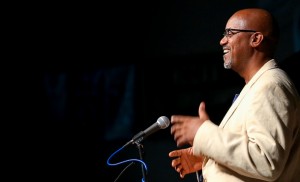
David Anderson Hooker, a mediator and consultant with a history of teaching in Center for Justice and Peacebuilding programs, proclaimed that he and Zehr shared something that nobody else in the room did: both are alumni of Morehouse College, a historically black college in Atlanta, which boasts graduates such as Martin Luther King Jr.
“You carry the mystique of a Morehouse man well,” said Hooker, adding that the “Morehouse man” is “well-read, well-traveled, well-spoken, well-balanced and…” He stopped. “You’ve got to work on well-dressed,” he concluded, to laughter from the crowd.
Kim Workman, director of the New Zealand-based organization Rethinking Crime and Punishment, not only told humorous stories, but played the keyboard and sang an original ditty he called “Ode to Howard.”
The Zehr bobble-head

As the evening drew to a close, Zehr’s family joined in the fun. His wife, Ruby, recalled one of their first dates in college, when Howard invited her to the snack shop to share a Coke because he did not have enough money for two. She was followed by Howard’s brother, Ed Zehr, who reminisced about Howard’s boyhood skills tinkering with electronics and gadgets.
When Zehr assumed the stage after 9 p.m., he was met with a standing ovation. Cracking jokes, he recounted the early days of restorative justice work with Canadian colleague David Worth, announcing their next 50-year plan for the field – expansion to a social movement.
At the end of the night, William Goldberg, director of the Summer Peacebuilding Institute and mastermind behind the festivities, presented the honoree with a custom Howard Zehr bobble-head doll.
“Ruby says my memorial service is taken care of, so she won’t need to have one when I die,” Zehr reflected afterwards. “I got off pretty easy overall!”
